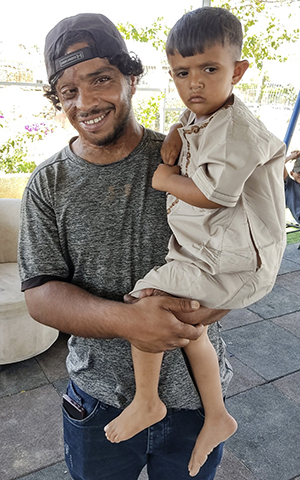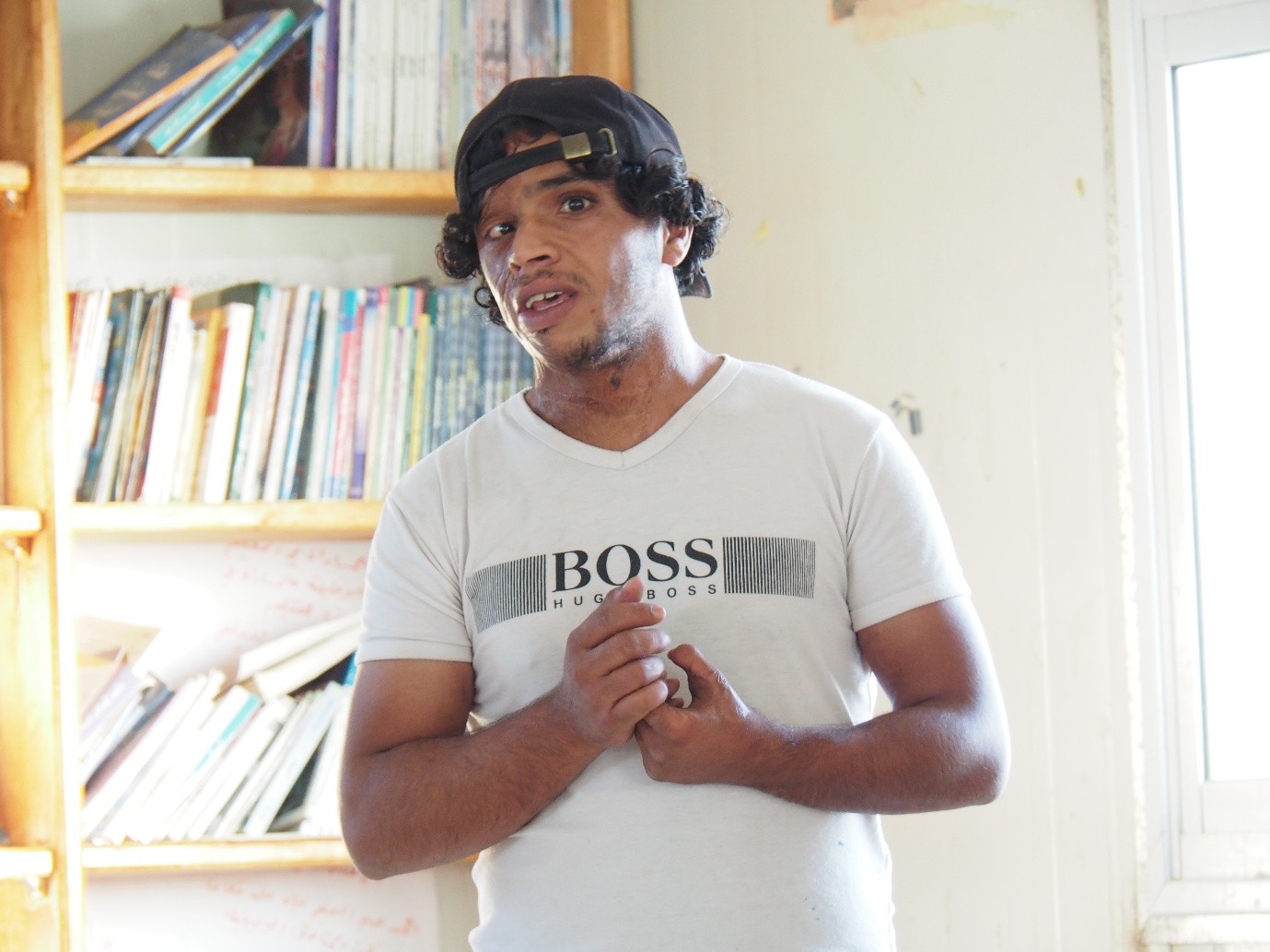Awdah during study tour visit to Um Al Khair in November 2019. Photo by John Hastings-Thomson
28 July 2025
I've just heard the sad news that my friend Awdah Hathaleen from the Bedouin village of Umm al-Khair has been killed by violent settlers who invaded the community's land. I cannot say for sure, of course, but eyewitness reports point to Yinon Levy, a notoriously violent settler from the nearby Meitarim Farm, as Awdah's possible killer. Levy was filmed at the site waving a handgun at the residents and opening fire (film clip of Levy posted by Yuval Abraham).
According to information I received from my friend, the activist Jim Haber, and others, armed Israeli settlers attacked the village of Umm al-Khair in Masafar Yatta in the south of the West Bank earlier today, killing Awdah in cold blood. The incident took place during a violent settler attack in which the settlers used a bulldozer to raze infrastructure in privately owned land at the edge of the village. When Awdah and other residents came out to try and prevent the destruction, he was shot twice in the chest. His brother, Ahmad, was critically injured when the bulldozer driver lifted the blade while advancing forward, hitting him in the head. Eid Hathaleen, a cousin and also a key activist in Umm al-Khair, is under arrest.
Following the incident, Israeli military forces went on to invade the village, arresting at least seven Palestinians and two foreign nationals. Currently there have not been any known arrests of Levy or the other settlers.
Umm al-Khair has long been targeted by the army and the settlers. The land was bought from other Palestinians by the Hathaleen clan, a Jahalin Bedouin family who, like the Jahalin tribe as a whole, had been evicted from their own ancestral lands in the Negev/Naqab desert inside what became Israel, in order to build the Israeli city of Arad. It houses some 700 people.
In 1980 the Israeli government expropriated (i.e., stole) much of Umm al-Khair's land to establish the settlement of Carmel. Today it is completely surrounded by Carmel -- its houses on one side, protected by gates and a high fence, massive chicken coops on the other side that comprises a main source of Carmel's income. In between, a road runs through the village travelled at will by the settlers, who often blare loud music in the middle of the night and shine spotlights on the Bedouins' homes.
In a 2010 piece in the New York Times, Nicholas Kristof described Carmel as "a lovely green oasis that looks like an American suburb. It has lush gardens, kids riding bikes and air-conditioned homes. It also has a gleaming, electrified poultry barn that it runs as a business. Beyond its barbed wire fencing, the Bedouins of Umm al-Kheir in shanties are denied connection to the electricity grid, barns for their livestock and toilets, and all attempts to build permanent dwellings are demolished. Elad Orian, an Israeli human rights activist, noted that the chickens of Carmel's poultry farm get more electricity and water than the Palestinian Bedouin nearby."
Demolitions occur in Umm al-Khair regularly. A few years ago ICAHD rebuilt part of a demolished home, one of more than a half-million demolished by Israel since the Nakba (more than 300,000 in Gaza alone since October 7th). A year ago, in June 2024, a third of the village was demolished by the Israeli authorities: 11 homes, leaving 50 shepherds homeless, including the family of Awdah's sister. (Awdah wrote about it in an article for +972.) A few months ago, in April, dozens of masked settlers attacked the people of Umm al-Khair with clubs, injuring five.
Although the police and military forces were at the scene, there were no arrests -- probably like today. Just last month West Bank District Police Commander Maj. Gen. Moshe Pinchi said publicly that protecting Israeli settlements takes precedence over enforcing law and order or protecting Palestinians. Indeed, the Police Commander of the West Bank, Avishai Muallem, is being investigated for papering over Jewish nationalist crimes to win the favor of National Security Minister Itamar Ben Gvir.
Yinon Levy has such a history of violence against Palestinians that he was sanctioned by the Biden Administration -- removed, needless to say, by Trump. Netanyahu's Finance Minister Bezalel Smotrich, a far-right settler leader who describes himself as a “fascist homophobe," said he had “taken care of the issue” of settlers being sanctioned , although Levy is still under sanctions by the UK, France, Canada and several other countries.
In 2021, the Mount Hebron Regional Council (of settlers, an official Israeli government body) gave Levy land near Umm al-Khair for the establishment of a private farm -- called the Meitarim Farm -- for "the preservation of the state’s lands and the seizure and preservation of the surrounding lands,” code for expelling shepherds who grazing lands these are. Since then he has led a violent campaign to expand settler land -- Awdah was killed trying to prevent the expansion of the Carmel fence further into his village -- resulting in 300 Palestinian farmers being driven from their land.

The killing of Awdah was almost foretold. He stood at the forefront in defending his community, but he was also a central figure in non-violent Palestinian resistance "on the ground," well known to international activists. Just last month he and Eid arrived in San Francisco with valid visas, at the invitation of the Kehilla Community Synagogue. They had been invited to speak at synagogues and churches in the Bay Area about their experiences in the West Bank; they were then to travel to DC and Boston. Their visas, however, were unexpectedly revoked upon their arrival, and they were summarily deported.
I wanted to give you this background surrounding Awdah's tragic and needless death. He would have wanted it framed in that context, the struggle for land, peace, liberation and just normal life in which he was engaged for so many years --even though he was only 31. But none of that can mask the deep personal sorrow of losing a friend, a comrade. ICAHD members and I extend our deepest sympathies to Awdah's wife Hanady and their three young children, together with the entire Umm al-Khair community. We will all miss him deeply.
We wish a full recovery for Ahmad, and hope for the quick release of Eid.
We must all seek justice and will continue Awdah's struggle for a free Palestine.
Jeff Halper
Director, ICAHD
Further links to Awdah are available:
- Awdah Al-Hathaleen interviewed.
- ICAHD UK webinar with Awdah Al-Hathaleen – 24 July 2024

